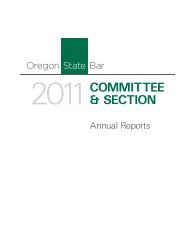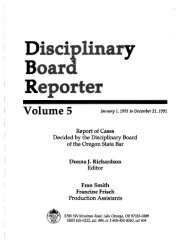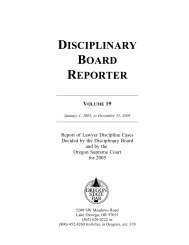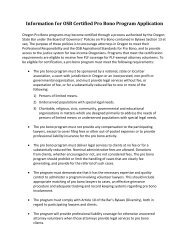February 22, 2013 - Oregon State Bar
February 22, 2013 - Oregon State Bar
February 22, 2013 - Oregon State Bar
You also want an ePaper? Increase the reach of your titles
YUMPU automatically turns print PDFs into web optimized ePapers that Google loves.
Law School Applications Are Collapsing (As They Should Be) - Business...<br />
http://www.theatlantic.com/business/print/<strong>2013</strong>/01/law-school-applicatio...<br />
3 of 4 1/31/<strong>2013</strong> 2:49 PM<br />
and falling pay isn't a bigger disaster is the federal government's income based repayment program,<br />
which caps student loan payments at 15 percent of income and forgives the balance after 25 years.<br />
The upshot of all this is that unless you're graduating from a truly top program -- and then, only if you<br />
graduate reasonably high in your class -- going to law school has turned into professional Russian<br />
Roulette. If it works out, you survive to pay off a truly enormous debt burden. If you don't make it on<br />
the job market, you've just spent three valuable years of your life sweating through deadening lectures<br />
and high-stakes finals for nothing, probably consigning yourself to a quarter-century loan payments<br />
the process.<br />
And yet, the response from law schools has amounted to not much more than some extremely belated<br />
soul searching. In June, the Wall Street Journal found 10 schools that are considering cutting their<br />
enrollment -- a positive development, but only an incremental one. And still, some members of the<br />
professoriate don't to understand the problems they're facing. Take this gem from the Times story:<br />
Some argue that the drop is an indictment of the legal training itself -- a failure to keep up with<br />
the profession's needs. "<br />
We have a significant mismatch between demand and supply," said Gillian K. Hadfield,<br />
professor of law and economics at the University of Southern California. "It's not a problem of<br />
producing too many lawyers. Actually, we have an exploding demand for both ordinary folk<br />
lawyers and big corporate ones."<br />
In a word, no. Legal education could do a better job teaching students actual practice skills, and maybe<br />
that would help a few students find gainful employment. But the difference would be on the margins,<br />
and there's simply no sign of "exploding demand" anywhere in the market. As Citi Private Bank -- the<br />
pre-eminent lender for major law firms -- noted in a recent report, demand for high-end corporate<br />
legal services has fallen at a 0.4 percent annual rate since every year since 2008. Revenue at big firms<br />
has grown slower than inflation. And while firms have tried to raise their official rates to make up the<br />
difference, the reality is they're handing out discounts left and right, particularly to big clients.<br />
And things aren't looking up any time soon. On the bottom of the market, companies like LegalZoom<br />
that provide basic legal documents online are taking work from solo-practice attorneys and small<br />
firms. On the higher end, the rate of major firm collapses has doubled since 2007, and Citi has a watch<br />
list of others it believes are at risk, especially as their old business models come under attack from new<br />
sources of competition. The rise of legal outsourcing firms that can competently handle breadand-butter<br />
corporate legal work in bulk will continue cutting into firms' profits. Computer programs<br />
capable of searching through vast troves of legal documents will continue to shrink on the number of

















